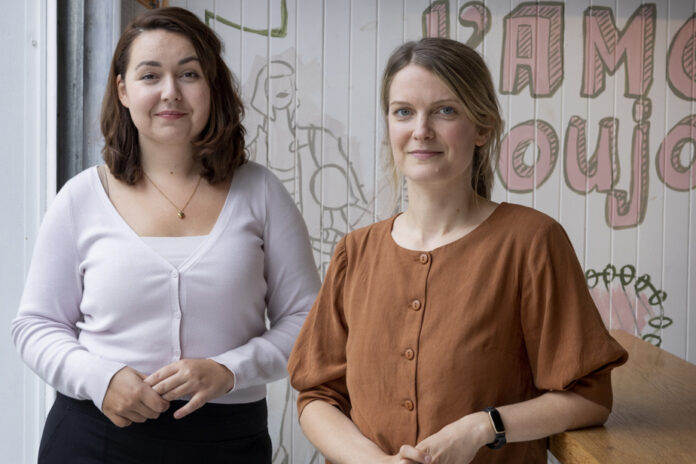Les Jours, Geneviève Dulude-De Celles’ most recent documentary, recounts a year in the life of Marie-Philip, from the moment she was diagnosed with breast cancer at age 28. In the eyes of the main person concerned, above all, but also in front of the lens of the filmmaker, the film exposes a little-known reality.
At the Rose Café, in Villeray, Geneviève Dulude-De Celles and Marie-Philip immediately give us the impression of being two good friends. We are not in the presence of a documentary filmmaker and her “subject”, but of two women linked by something greater.
One, Marie-Philip, was diagnosed with breast cancer a few years ago, a week before her 29th birthday. The other, Geneviève, always lived knowing that breast cancer attacked the women in her maternal family. Marie-Philip has experienced illness and everything that comes with it. Geneviève told her story.
The filmmaker, after her first fiction film, A Colony, published in 2019, planned to make a documentary on the journey of several women who had recently been diagnosed with breast cancer. She imagined a series of interviews that would allow them to better understand the impact of the disease on their daily lives.
The project for the film Days began during the pandemic and the production hired a casting agency to find participants. “It allowed me to seek out people who were willing to talk without feeling like I was forcing anyone’s hand,” says Geneviève Dulude-De Celles. Finally, the filmmaker found only one person: Marie-Philip.
Marie-Philip found the announcement on the page of a support group on social networks. She agreed to participate. At this time, Geneviève still had the idea of interviewing several women.
Because the pandemic prevented gatherings at the time, Marie-Philip created a Facebook group for those around her, to whom she sent videos to keep them informed of developments. After their meeting, Marie-Philip invited Geneviève to join the group.
“Along the way, I ended up abandoning interviews, I wanted to film her in her life context, and, given COVID, I had less access, so I decided to give her little camera to take her own images. »
Above all, Geneviève decided that her documentary would only talk about the story of Marie-Philip. Days talks about his treatments, his joys and his disappointments, his loved ones, his relationship with his body, his search for love too, through illness.
When Marie-Philip learned she had breast cancer, she couldn’t find anyone her age who was going through the same thing. In hospital support groups, older women discussed issues that did not concern them.
“The issues are not the same. I didn’t know if I wanted to have children and people talked to me about infertility,” she adds. Thus, one of the reasons for Geneviève Dulude-De Celles’ film became “to show this blind spot,” says the director. The days took shape over time.
“At first, I thought I was going to be a two-minute extra in a Canal Vie documentary,” says Marie-Philip, whose face adorns the poster of the documentary, premiering at the Quebec City Film Festival last week. I now realize everything that is happening. […] I still have a certain fear of being perceived as frail and sick. But on the other hand, I find it important that we see all these aspects of the disease. Like dating after illness or impact on loved ones. »
Having become the main subject of a film, Marie-Philip says she never felt “invaded”. Geneviève’s kindness and gentleness made it possible to do things at the right pace. “I was only there about once every three weeks,” says the filmmaker. The rest of the time, Marie-Philip provided me with what she wanted from what she had filmed herself. »
In addition to the hours of videos captured over a little over a year by Marie-Philip and what she had filmed herself, Geneviève Dulude-De Celles was also able to access archive videos, as well as to the photo and video content of the young woman’s cell phone.
“I realized the obvious: my great interviews with my big equipment, my big technique, my big camera, ultimately, it was not worth what Marie had captured with her little $200 camera. That’s what mattered. It was more telling. »
“I also feel that by being around her, it made something that was abstract for me more concrete,” implies Geneviève Dulude-De Celles. I looked at the women in my family, what they experienced, and there was a fear of talking about these subjects. It allowed me to understand reality. »
Both hope that this “reality” can now be seen by as many people as possible. “I hope, for example, that it can educate younger people to do self-exams,” says Marie-Philip. “I had never examined my breasts before. I didn’t even think it was possible to have breast cancer before age 40. »








